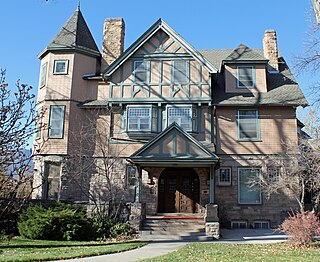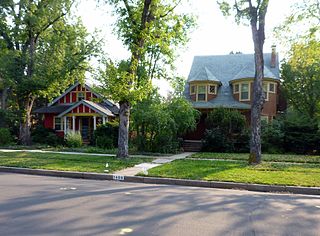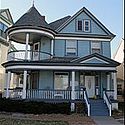
Manitou Springs is a home rule municipality located at the foot of Pikes Peak in western El Paso County, Colorado, United States. The town was founded for its natural mineral springs. The downtown area continues to be of interest to travelers, particularly in the summer, with many shops and restaurants, as well as a creekside city park. The main road through the center of town was one of the direct paths to the base of Pikes Peak. Barr Trail, which winds its way up Pikes Peak, is accessible from town. The subdivision Crystal Hills was added to the municipality in the 1960s.

The Fan is a district of Richmond, Virginia, so named because of the "fan" shape of the array of streets that extend west from Belvidere Street, on the eastern edge of Monroe Park, westward to Arthur Ashe Boulevard. However, the streets rapidly resemble a grid after they go through what is now Virginia Commonwealth University. The Fan is one of the easterly points of the city's West End section, and is bordered to the north by Broad Street and to the south by VA 195, although the Fan District Association considers the southern border to be the properties abutting the south side of Main Street. The western side is sometimes called the Upper Fan and the eastern side the Lower Fan, though confusingly the Uptown district is located near VCU in the Lower Fan. Many cafes and locally owned restaurants are located here, as well as historic Monument Avenue, a boulevard formerly featuring statuary of the Civil War's Confederate president and generals. The only current statue is a more modern one of tennis icon Arthur Ashe. Development of the Fan district was strongly influenced by the City Beautiful movement of the late 19th century.

Cascade is an unincorporated community and U.S. Post Office in El Paso County, Colorado, United States. The ZIP Code of the Cascade Post Office is 80809.

Old Colorado City, formerly Colorado City, was once a town, but it is now a neighborhood within the city of Colorado Springs, Colorado. Its commercial district was listed on the National Register of Historic Places in 1982. It was founded during the Pikes Peak Gold Rush of 1859 and was involved in the mining industry, both as a supply hub and as a gold ore processing center beginning in the 1890s. Residents of Colorado City worked at some of the 50 coal mines of the Colorado Springs area. It was briefly the capital of the Colorado Territory. For many years, Colorado Springs prohibited the use of alcohol within its border due to the lifestyle of Colorado City's opium dens, bordellos, and saloons. It is now a tourist area, with boutiques, art galleries, and restaurants.

Before it was founded, the site of modern-day Colorado Springs, Colorado, was part of the American frontier. Old Colorado City, built in 1859 during the Pike's Peak Gold Rush was the Colorado Territory capital. The town of Colorado Springs was founded by General William Jackson Palmer as a resort town. Old Colorado City was annexed into Colorado Springs. Railroads brought tourists and visitors to the area from other parts of the United States and abroad. The city was noted for junctions for seven railways: Denver and Rio Grande (1870), Denver and New Orleans Manitou Branch (1882), Colorado Midland (1886–1918), Colorado Springs and Interurban, Atchison, Topeka, and Santa Fe (1889), Rock Island (1889), and Colorado Springs and Cripple Creek Railways. It was also known for mining exchanges and brokers for the Cripple Creek Gold Rush.

Jules Jacques Benois Benedict was one of the most prominent architects in Colorado history, whose works include a number of well-known landmarks and buildings listed on the National Register of Historic Places.

There are nine historic districts in Meridian, Mississippi. Each of these districts is listed on the National Register of Historic Places. One district, Meridian Downtown Historic District, is a combination of two older districts, Meridian Urban Center Historic District and Union Station Historic District. Many architectural styles are present in the districts, most from the late 19th century and early 20th century, including Queen Anne, Colonial Revival, Italianate, Art Deco, Late Victorian, and Bungalow.

Manitou Springs Historic District in Manitou Springs, Colorado is roughly bounded by US 24, Ruxton Avenue, El Paso Boulevard and Iron Mountain Avenue. Listed in the National Register of Historic Places, it is one of the country's largest National Historic Districts.

Manitou Mineral Springs are natural mineral springs in Manitou Springs, Colorado and Cheyenne Spring House is on the National Register of Historic Places. The springs are located in one of the country's largest National Historic Districts.

Manitou Springs Bridges are historic bridges are located on Park and Canon Avenues over Fountain Creek in Manitou Springs, Colorado. The bridges are on the National Register of Historic Places.

Wheeler Bank is a historic building located on Manitou Avenue in Manitou Springs, Colorado built by Jerome B. Wheeler. It is on the National Register of Historic Places. Over the course of its history, the building has been a financial institution, auditorium and retail business.

Crystal Valley Cemetery is a cemetery located on Plainview Place in Manitou Springs, Colorado. Since its establishment in 1882, it has been the principal cemetery in Manitou Springs. It is listed in the National Register of Historic Places.

Monument Valley Park is a historic, recreational park in Colorado Springs, Colorado through which Monument Creek flows. It is a National Register of Historic Places listing and is on the Colorado State Register of Historic Properties.
Englemann Canyon is a valley along Ruxton Creek, in Manitou Springs, El Paso County, Colorado. It is one of three canyons in Manitou Springs, the others are Ute Pass and Williams Canyon.

The Hagerman Mansion is a historic house located at 610 North Cascade Avenue in Colorado Springs, Colorado.

Gwynne–Love House, also known as Goldmuntz Cascade House, is a historic house in Colorado Springs, Colorado that was placed on the National Register of Historic Places and the Colorado State Register of Historic Properties in 1987.

The Mountain Avenue Historic District is a stretch of historic houses on Mountain Avenue in Princeton, New Jersey that date to the 19th and early 20th centuries. The 9-acre (3.6 ha) historic district was added to the National Register of Historic Places on February 2, 1995, for its significance in architecture and community planning. It includes 14 contributing buildings, and encompasses the north side of the road between the west side of the Mountain Lakes Preserve and Quarry Lane.

Old North End Historic District of Colorado Springs, Colorado is located north of Colorado College between Monument Valley Park, an alley between Weber and Nevada Streets, and Uintah and Lilac Streets. It was called North End Historic District until September 2015 when the district boundaries were expanded and the neighborhood was renamed.
The Historic Uptown neighborhood is located in the city of Colorado Springs, Colorado, United States. The neighborhood's boundaries are Cache La Poudre St. to the north, Bijou St. to the south, the alley situated between Wahsatch Ave. and Corona St. to the east, and Monument Valley Park to the west. It was called the Near North End neighborhood until 2023 when it was renamed to the Historic Uptown Neighborhood by the Historic Uptown Neighborhood Board to avoid confusion with the Old North End Neighborhood.
The Weber-Wahsatch Historic District is a residential neighborhood located in Colorado Springs, Colorado. Renowned for its rich architectural diversity and historical significance, the district was added to the National Register of Historic Places in 1985. Encompassing streets lined with Victorian and early 20th-century homes, historic churches, and schools, the area is a testament to Colorado Springs' dynamic history.
























